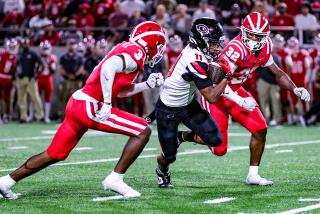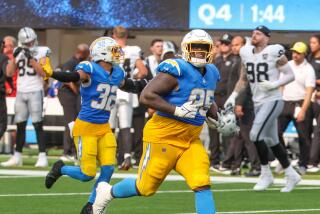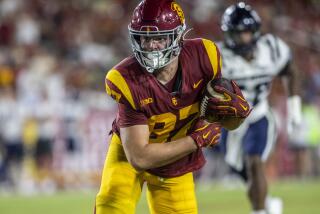Double Trouble for Offenses : College football: Colorado’s McGhee and Williams, opponents when they played in high school, might be the best linebackers in the nation.
- Share via
Colorado’s Kanavis McGhee knows what a sack is: “Pushing, rushing, turning, sweating, turning, ripping, clawing and scratching,” he says. “All that hard work pays off when you finally get it.”
But to get a sack for Colorado, an outside linebacker has to do more than fight past a tackle or a tight end, elude a blocking back and get to the quarterback to drag him down before he throws.
He also has to be the first to get there. Any dawdling, any delay, and the sack McGhee was after might belong to Alfred Williams, his teammate and roommate.
They are probably the finest pair of college linebackers in the country, Williams and McGhee--each at least 6 feet 5 and 230 pounds or more. Each is agile, fast and strong.
Each has a chance to be the first player taken in the next NFL draft.
Williams and McGhee will be united as fifth-ranked Colorado tries to stop ninth-ranked Tennessee and the Volunteers’ outstanding running back, Chuck Webb, when the teams open the college football season Sunday in the first Disneyland Pigskin Classic at Anaheim Stadium.
They will be united this season, trying to drive the Buffaloes toward a national championship after last year’s 11-0 regular-season record was spoiled by a loss to Notre Dame in the Orange Bowl.
But along the way, there will be subtle competition between them. Close as they are, they will be seeing one another at every turn, opponents in every race for every honor.
Williams, 6-6 and 230, is the favorite of the Sporting News for both the Butkus Award, given to the nation’s top linebacker, and the Lombardi Award, given to the top lineman or linebacker.
McGhee, 6-5 and 250, is ranked second for the Butkus by the publication, and seventh for the Lombardi, for which McGhee was one of four finalists last season.
Both players thought about declaring for the NFL draft last year as juniors. Now, as they look forward to the 1991 draft, McGhee is rated the No. 1 prospect by Don Heinrich’s Pro Preview. The same preview picks Williams second.
“Sometimes it can be difficult, knowing the person you have to compete with is on the same team you’re on, playing against the same teams you play against,” said Williams, who last season had 10 1/2 sacks, 14 quarterback hurries and five pass deflections. He was selected first-team All-American by United Press International and second team by Associated Press.
“There’s a silent competition going on. We compete for sacks and tackles. . . . But whatever way they decide to do it. If it was between me and Kanavis, and he won it--he’s like my brother, he’s been my roommate since I first came to campus--I couldn’t be any happier. He feels the same.”
The only concern is that there be enough tackles for each to get his share. Last year, with quarterback Darian Hagan and running back Eric Bieniemy spearheading an offense that averaged 41.1 points, the defense wasn’t on the field very much.
With a defense that gave up an average of 13.6 points, McGhee and Williams sat out six entire quarters because the games were blowouts.
“We hope there are enough tackles for both of us,” said McGhee, who had seven sacks, nine hurries and four pass break-ups last season and was selected second-team All-American by UPI. “We worried about that last year. It was enough to go around for everyone.”
Williams and McGhee were bumping elbows long before they arrived in Boulder. Both are from Houston, their homes perhaps 15 minutes apart. In high school, both played football and basketball, and both competed in track and field. At Jesse Jones High, Williams threw the discus, put the shot and high-jumped. McGhee did all of those and also ran some sprints for Wheatley High.
At every turn, it seemed, they met.
“The first time I really noticed him was my freshman year, playing basketball,” Williams said. “I was a freshman and he was a freshman. And as freshmen, some things just seem a little more extraordinary than others.
“We were warming up for the game, and he dunked the basketball. He could dunk early on. All my teammates, said, like, ‘He can do it. Why can’t you?’ That was the first time I really was aware who he was.”
But they didn’t discover that they would be going to college together until late in their senior years, the last time their basketball teams played each other.
“I found out right before the game, and he found out, too,” Williams said. “That was the first time my varsity team beat him.”
They have been together since, both playing a lot as freshman and becoming starters as sophomores.
When McGhee started last season slowly, still recovering from a broken ankle suffered against Nebraska the season before, Williams started quickly, with 2 1/2 sacks against Texas in a season-opening 27-6 victory and two more the next week against Colorado State in a game the Buffaloes won, 45-20.
He had one of his finest moments against Illinois in the third game, a 38-7 victory. It was a flashy, spinning sack of Illini quarterback Jeff George, one of two Williams had that game.
McGhee prospered later in the year, and although his sack numbers were not as flashy as Williams’, he might be the better defender against the run.
“Kanavis has the body type, and the strength, to be better against the run,” said Bob Simmons, who coaches Colorado’s outside linebackers. “He’s 250, and can bench(-press) 400 pounds.”
McGhee is able to rush or drop back into pass coverage and is a hard-hitting tackler. Williams is taller, lighter and less bruising, but is faster and quicker.
“I’ve had one or two players like them, but never two at the same time of such ability, size and speed,” Simmons said. “Yeah, I feel blessed.”
Opponents do not.
“I’ve heard guys making comments that they are aware where they are at all times,” Simmons said. “When people make up their game plan and blocking schemes, you know they’re paying attention to them.”
Williams knows that, and offers sympathy.
“I’d have to think it’s a difficult game plan if I was the offensive coordinator, knowing we could be coming every time,” he said.
McGhee knows it, too.
“If they come my way, I know I’m going to get them. If they go the other way, Alfred’s going to get them. If they go up the middle, I have confidence in the middle of our line. I wonder what they’re thinking. Which way can they go?”
More to Read
Go beyond the scoreboard
Get the latest on L.A.'s teams in the daily Sports Report newsletter.
You may occasionally receive promotional content from the Los Angeles Times.










